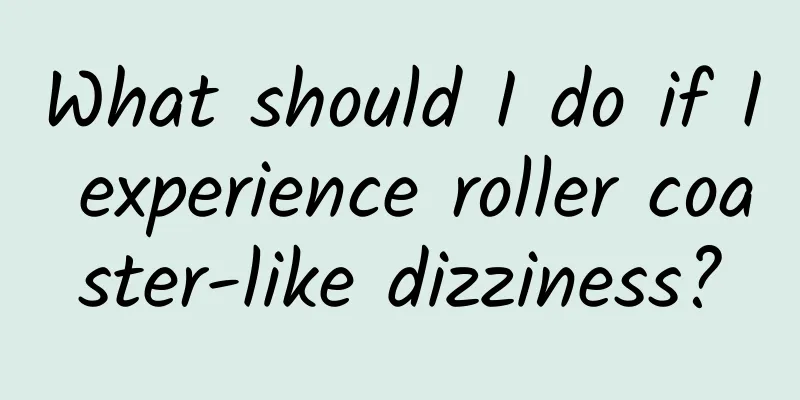What should I do if I experience roller coaster-like dizziness?

|
Author: Xiao Lin China Rehabilitation Research Center Beijing Boai Hospital Reviewer: He Jingjie, Chief Physician, Beijing Boai Hospital, China Rehabilitation Research Center Figure 1 Copyright image, no permission to reprint "Roller coaster" is a common game in amusement parks. I believe many people have experienced the excitement of diving and flipping in the air while riding a roller coaster. But if you feel the same as riding a roller coaster on the ground, you will not be able to bear it! Some friends who have not experienced riding a roller coaster will ask what kind of feeling is vertigo? From the literal meaning, we can understand it as dizziness. In medicine, it can be explained as the subjective feeling that oneself or external objects are rotating, rising, falling, tilting, etc. Figure 2 Copyright image, no permission to reprint What should you do if you feel dizzy? Will it go away after a short rest? In fact, it is not as simple as you think. Some dizziness is physiological, such as motion sickness and seasickness, which can cause transient dizziness, nausea, and vomiting. This type of dizziness can be quickly relieved after rest. However, some dizziness is pathological and needs to be diagnosed and treated in a regular hospital in time. Here are some common pathological causes of vertigo. 1. Benign paroxysmal positional vertigo Also called otolithiasis, it is generally believed to be caused by the detachment of otoliths (a type of crystal in the ear that helps control body balance). It is more common in the elderly and women and may heal on its own, so it is called "benign vertigo". It may cause a brief dizziness and nystagmus (involuntary, rhythmic eye movement, also known as nystagmus) when the body or head position changes. It gradually eases after being still or lying flat. It can also be treated by manual repositioning in the otolaryngology department, but it may recur. This type of vertigo should be treated by an otolaryngologist. 2. Meniere's disease Meniere's disease is an inner ear disease that may be related to the imbalance of endolymph production and absorption leading to hydrops in the membranous labyrinth, and it mostly occurs in young and middle-aged people. The main manifestations are recurrent vertigo, fluctuating hearing loss (worsened during vertigo attacks, relieved during intervals, and showing obvious fluctuations), tinnitus and (or) a feeling of fullness in the ears. The vertigo of patients with Meniere's disease is mostly sudden, and they feel that they or the objects around them are rotating (that is, the world is spinning), or that their bodies are shaking, rising, falling, or floating. Vertigo attacks may be accompanied by autonomic nervous system symptoms such as nausea, vomiting, pale complexion, cold sweats, slow pulse, and decreased blood pressure. Vertigo worsens when the patient opens his eyes and turns his head, and is relieved when he closes his eyes and lies still, and it lasts for a short time. Meniere's disease cannot be completely cured, but active medication, surgery and rehabilitation treatment can alleviate or control symptoms and preserve hearing. Patients with Meniere's disease should pay attention to a low-salt diet, quit smoking and drinking, and avoid foods containing caffeine and chocolate. Allergic reactions can cause dizziness to worsen, so patients who are allergic to pollen should avoid contact with allergens. Patients with Meniere's disease can go to the otolaryngology department or neurology department for treatment. 3. Vestibular neuronitis Vestibular neuronitis, also known as vestibular neuritis, is an inflammation of the vestibular nerve and vestibular ganglion, and is often caused by an upper respiratory tract infection. The main symptoms are sudden onset of severe vertigo, accompanied by balance disorders, nystagmus, nausea, vomiting, etc., without hearing loss. The duration of vertigo is short, generally no more than 3 weeks, and can be relieved within a few days. The treatment of vestibular neuritis is mainly to eliminate the inducement. After hormone, antiviral and rehabilitation treatment, the patient's symptoms can be significantly relieved. Avoid coffee, spicy and greasy food in your daily diet. Eat animal liver, milk and lean meat to enhance the body's immunity. This type of vertigo can be diagnosed and treated in the neurology department. 4. Vertebral artery type cervical spondylosis Figure 3 Copyright image, no permission to reprint Vertebral artery type cervical spondylosis is a type of cervical spondylosis. It is caused by vertebral instability due to degenerative changes in the cervical spine, which compresses the adjacent vertebral arteries and causes ischemia of the vertebral-basilar artery. The main manifestations may include symptoms of general cervical spondylosis (such as vertigo or dizziness, neck pain, limited neck movement, etc.) and symptoms of insufficient blood supply to the brain (such as migraine, tinnitus, hearing loss, blurred vision, etc.). Examinations related to the cervical spine and vertebral arteries can confirm that degenerative changes in the cervical spine compress the vertebral artery and affect the blood supply to the posterior circulation of the brain (vertebral-basilar artery). For patients with mild symptoms, neck movement can be limited by wearing a neck brace (a medical protective device to protect the cervical spine). If dizziness and vertigo are more obvious, drugs that improve blood circulation can be used to increase blood supply to the vertebral artery. For patients with severe vertebral artery compression who cannot relieve symptoms with conservative treatment, surgical treatment can be used. In daily life, you should pay attention to maintaining a correct posture to reduce the pressure on the cervical spine. Do not work or study with your head down for a long time, avoid leaning your head forward for a long time, and do not sit in the same position for a long time. Avoid using a pillow that is too high. Choose a pillow of appropriate height so that the neck muscles can be fully relaxed when sleeping. Pay attention to proper movement of the shoulder and neck muscles to relieve fatigue. You can hold your head with both hands and lean back and forward to move your neck alternately. You can also do circle movements of your head and neck, but the movements should be gentle and slow. Pay attention to keeping your shoulders and neck warm. In addition, try to avoid attaching heavy objects to your head and neck, such as hanging a backpack on your neck. If you suspect you have cervical spondylosis, you can go to the spine surgery or orthopedics department for treatment. Figure 4 Copyright image, no permission to reprint 5. Cerebrovascular disease Vertebral-basilar artery transient ischemic attack, cerebral infarction, cerebral hemorrhage and other diseases can cause vertigo, which is more common in cerebellar and brainstem lesions. It is more common in the elderly, accompanied by chronic underlying diseases such as hypertension, arteriosclerosis, diabetes, etc. Vertigo can be mild or severe, lasts for a long time, has no definite relationship with the position of the head, and has a large amplitude of nystagmus, which may cause cranial nerve damage, paralysis or convulsions. People with a stroke should go to the hospital promptly. After evaluating the condition, the doctor will choose to have a CT or MRI scan of the head to determine whether the stroke is ischemic or hemorrhagic. If necessary, corresponding cerebrovascular examinations (head and neck MRA or CTA, or even DSA) will be done so that appropriate treatment can be given. In daily life, you should pay attention to a low-salt, low-fat diet. If you have diabetes, you should follow the diabetic diet, quit smoking and drinking, monitor blood pressure, blood sugar, and blood lipids and keep them within the normal range, control your weight, drink plenty of water, eat more fresh vegetables, and take in essential amino acids. You can do appropriate exercise under the guidance of a doctor, such as jogging, brisk walking, etc., but do not do strenuous activities, avoid excessive fatigue, stay up late, etc. Check your blood vessels regularly with color Doppler ultrasound. If necessary, you can use antiplatelet aggregation drugs such as aspirin or clopidogrel, statins that lower blood lipids and stabilize arterial plaques after evaluation by a doctor, and do a good job in preventing cerebrovascular disease. Dizziness caused by cerebrovascular disease should be treated in the Department of Neurology. In addition, diseases such as acoustic neuroma and temporal lobe tumors can also cause vertigo. Such vertigo should be treated by neurosurgery. In short, if vertigo occurs, you should go to the hospital immediately for a detailed interview, physical examination, and necessary auxiliary examinations by the doctor to clarify the corresponding cause. Then, according to the different causes, the department will be triaged and targeted treatment will be given. Do not abuse anti-vertigo drugs before the cause is clear, so as not to cover up the condition and delay treatment. |
>>: What's going on with the golden monkeys in Yunnan, Guizhou and Sichuan?
Recommend
One step closer to completion! A picture shows the growth process of China's space station
On October 31, the Long March 5B Yao-4 carrier ro...
5000 words reveal: Douyin’s distribution strategy for interest e-commerce
The title "The distribution method of Douyin...
A guide to avoiding pitfalls when promoting KOLs
Inspired by the recent criticism of traffic fraud...
A Chinese dung beetle can be sold for less than two dollars in Australia? Because dung beetles are also picky eaters
An initial population of 1,500 Chinese dung beetl...
The "Ball 2" digital life plan is revealed. How long will it take for the dream to come true?
After watching the movie, many people are very in...
Daily Fresh Product Analysis
With the development of the Internet, many servic...
Is the effect of bidding promotion declining? You must analyze these 8 factors
Nowadays, most of our SEM promotions revolve arou...
Dry and itchy skin after showering? You may be doing these 5 things wrong
The temperature has dropped sharply recently, and...
Tesla Financial Report: Tesla's revenue in Q3 2022 was US$21.454 billion, and its net profit increased by 103% year-on-year
Tesla Motors recently released the company's ...
For Toutiao account operation, it is not a dream to create 10W+ by doing these 5 things!
The advantages of Toutiao are that it has a large...
The three stages of event operation: How to plan an event with 10,000 participants
Event operations stimulate the improvement of sho...
When operating a website, consider user loyalty first, then think about product awareness!
When many novice website operators get a website ...
Small flaws in iOS native image tagging that you may not have noticed
As we use smartphones for longer periods of time ...
iOS permanent version Xunlei is here. The most complete tutorial for BT and magnet link downloads
On July 13, Xunlei, an iOS version that had been ...
Xi'an sauna massage release
Content: Xi'an tea friends resource sharing a...









